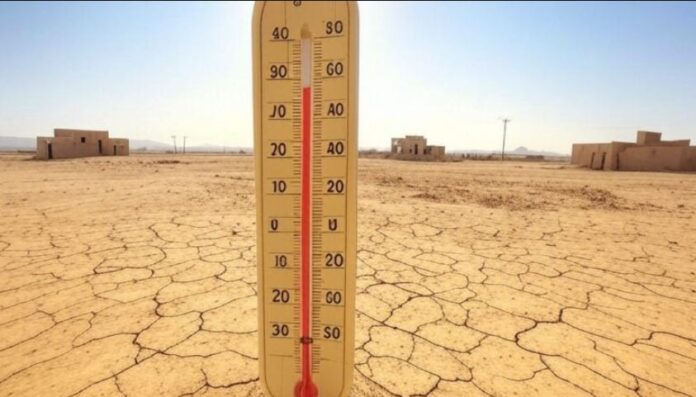Balochistan Faces Record Heat: Sibi to Hit 47°C, Farmers Fear Crop Loss
The intensity of the heat is increasing with each passing day across the country, and most areas of Balochistan are in the grip of intense heat.
According to the Balochistan Meteorological Department, the highest temperature is likely to be recorded in Sibi in the next few days.
The maximum temperature is expected to be 47 in Sibi, 46 in Turbat, 44 in Lasbela, 43 in Nokundi, 41 in Dalbandin and 35 degrees Celsius in the provincial capital Quetta.
According to the Meteorological Department, dry heat is likely to occur in Sibi, Kachhi, Sohbatpur, Lahri, Naseerabad, Jhal Magsi, Turbat, Lasbela, Washuk, Kharan, and Chagai, while there is also a risk of heatwave.
While the intensity of the heat is affecting the common people, the risk of damage to crops due to the heatwave has also increased.
According to Khalid Hussain Bath, Chairman Kisan Ittehad, just as a heat wave affects the human body, there is also a risk of crops being destroyed due to extreme heat.
He said that when a crop is planted in extreme heat, its seeds cannot withstand the heat, and in this case, the next crops may burn.
Moreover, crop production also decreases during extreme heat. In the past, when the weather was favorable, we used to get 50 to 60 maunds of wheat per acre, but now wheat production has come down to 20 to 25 maunds per acre.
Khalid Hussain Bath said that due to the intensity of the heat, the canal areas of Balochistan are suffering the most, where there is a shortage of water. If this situation continues, crops may suffer severe damage.
Therefore, the government must provide seeds that can continue production even in extreme heat, otherwise farmers may lose billions of rupees and may also face food shortages.
Talking to Naji News, Dr. Mahmood Ahmed said that the intensity of the heat has increased in Balochistan, and the rush of people affected by the heat wave may increase in hospitals.
According to Dr. Mahmood Ahmed, there is a risk of heat stroke if precautions are not taken during a heat wave.
Symptoms of heat stroke include sweating, feeling weak or tired, dizziness, rapid heartbeat, nausea or vomiting, headache, fever, red or dry skin, difficulty breathing, and fainting.
Dr. Mahmood Ahmed said that some important steps are needed to prevent heat stroke.
Water and other beverages should be consumed as much as possible, it is important to avoid the sun, especially from 11 am to 4 pm.
It is important to wear light-colored open clothes and reduce the consumption of meat in the diet, and increase the consumption of fruits and vegetables to avoid heat stroke.



